Combat
Introduction
Combat in The Doors of Trithius is turn-based and built around timing. Each action you take progresses time, giving enemies more or less time to respond.
You can attack by clicking on an enemy or walking into them. This performs your default weapon attack.
Your abilities are shown on the hotbar. At first, you'll only have Jump, but new abilities are unlocked by choosing skills.
Keep reading to learn more about how combat works.
Health & Energy
At the bottom of your screen you'll see your health and energy.

Health is your life total:
- Health regenerates a small amount each turn, based on your Health Recovery stat.
- You can recover more quickly by eating food, drinking potions, or using healing abilities.
Energy is used to cast spells and activate abilities:
- It regenerates automatically each turn, based on your Energy Recovery stat.
- If you rest on your turn (default space), you'll gain extra energy. Resting can be a surprisingly powerful technique in combat.
Unlike many RPGs,
The Doors of Trithius has no attributes. There are very few ways to increase your max health.
Most humans in the world have around 100 health. Weak monsters will have less. Stronger monsters may have hundreds. To survive you'll need improving your defenses through better gear, abilities, or buffs.
Status Effects
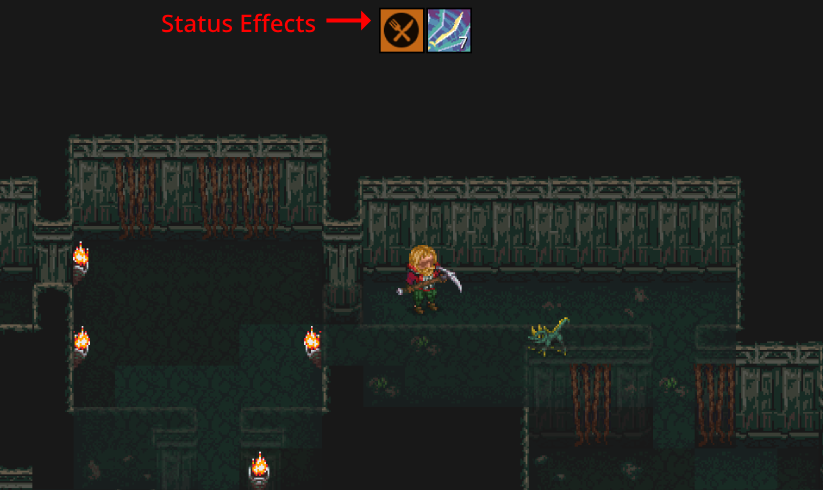
Status effects are temporary bonuses or penalties. You'll see them at the top of your screen.
- Most status effects last a number of turns. Hover your mouse over any status icon to see details.
- Some monster attacks apply status effects. For example, Webber Spiders can shoot a web that gives you the
Webbed status for 3 turns, slowing your attacks and movement.
- There are also persistent status effects, such as hungry,
exhausted, or
over-encumbered. These don't expire on their own and are usually displayed in orange.
Wounds
Wounds are long-term debuffs that appear just above your health bar.
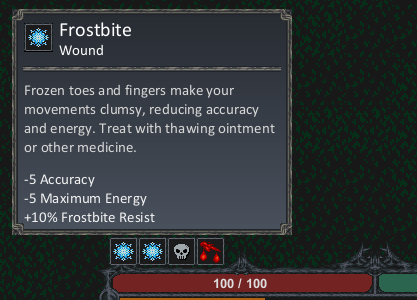
To heal a wound you can use medicine items like
bandages (for bleeds) or
splints (for cripples). Some wounds, like bleeds and poisons, also have a small chance to heal themselves each turn.
The Medicine skill helps with crafting cures, but most towns sell basic treatments too.
Common Wounds
| Wound |
Effects |
Description |
Bleed (severe)

|
Deals 2 damage per turn. |
Deals 2 damage every turn. Becomes a regular bleed wound after 10 turns. Cauterize with bandages or other medicine to heal immediately. |
Bleed

|
Chance to deal 1 damage each turn. |
Has a 25% chance to deal 1 damage every turn, and a small chance to remove itself over time. Cauterize with bandages or other medicine to heal immediately. |
Poison

|
Deals stacking damage each turn. |
Deals damage every turn, which increases with each additional stack. Has a small chance to remove itself over time. Treat with antidote or other medicine. |
Cripple

|
Reduces move speed and disables mobility actions. |
Significantly impedes movement and prevents jumping or other athletic-based abilities. Set crippled limbs with a splint or other medicine. |
Burn

|
Reduces max health and crit chance. |
Deep tissue burns affect your will to fight, reducing maximum health and critical hit chance. Treat with soothing balm or other medicine. |
Frostbite

|
Reduces accuracy and max energy. |
Frozen toes and fingers make your movements clumsy, reducing accuracy and energy. Treat with thawing ointment or other medicine. |
See the Wounds page for a complete list of wounds.
Resisting Wounds
Most wounds have a resistance stat: BleedResist, PoisonResist, etc.
WoundResist gives general protection.
For a wound to be inflicted via combat, the enemy must damage you. Dodged or 0-damage hits can't apply wounds.
Since wounds can stack they can quickly turn a fight deadly. Bring medicine when exploring dungeons. Still, not every wound needs immediate treatment — some can wait until you're back in town.
Inspecting Monsters
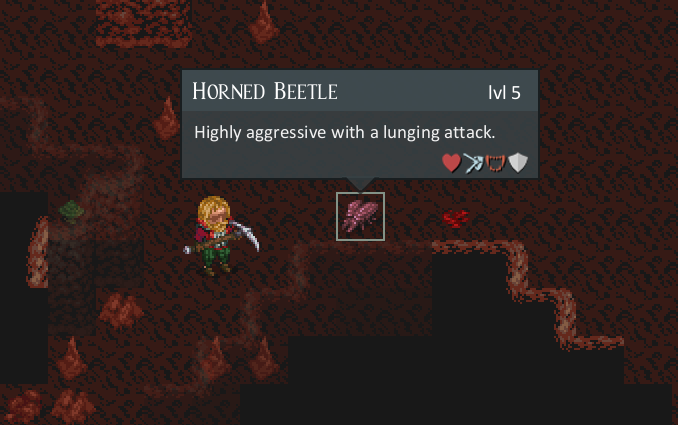
Traits
Right-click any monster to see its traits. (Keyboard players can use the Inspect key.)
The bottom row shows
trait icons. These hint at the monster's special attacks and what wounds it may inflict.
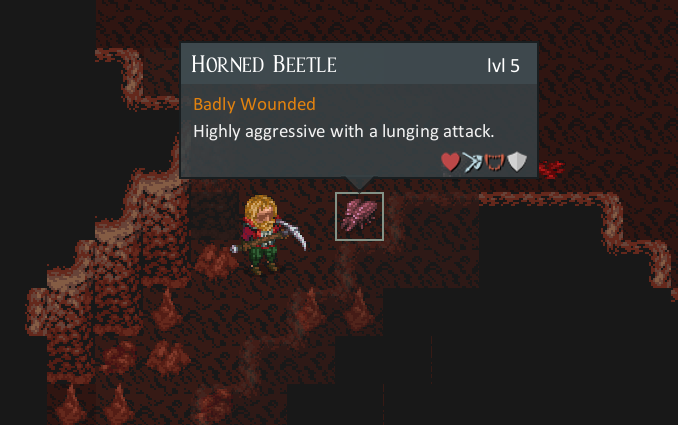
Monster Health
Exact HP is hidden. Instead, the inspect window will tell you if a monster is
wounded (below 55%) or badly wounded (below 10%).
You can also press the "Show Names" (default N) key to reveal all monster names in sight. Monster name color changes with damage:
- Orange: Wounded
- Red: Near death
Attacking & Time
Actions & Time
Most actions you take such as moving, attacking, opening a door, or using an ability, consume time and take a turn.
(note: some actions, like drinking a potion, are
instant and don't consume a turn).
Not all actions pass the same amount of time. Faster actions give enemies less opportunity to respond. If you're fast enough, you can act multiple times before your enemy does.
Example: A
Shiv has a speed of 140. A
Rusted Greatsword has a speed of 70.
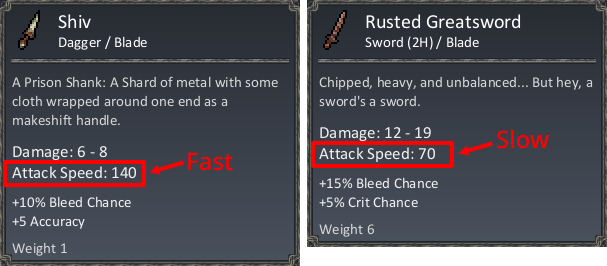
Finding Your Speed
Your speed is based on your movement and attack speed stats. You can improve these with potions, abilities, or equipment.
Example: Blade Rush is an ability that increases your attack speed. Activating it takes time as well, shown in the lower-right corner of the tooltip.
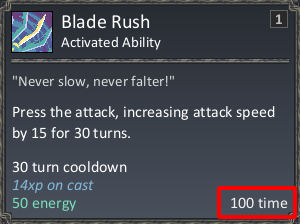
Some abilities use your base speed, other abilities modify or override your base speed for extra fast (or slow attacks).
Want to go deeper? see the Time page for full mechanics.
Abilities
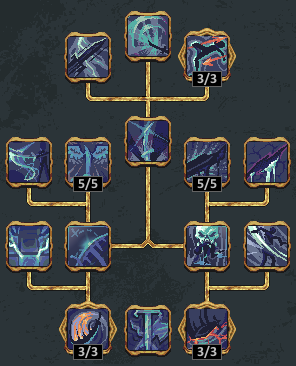
Your abilities are located on the hotbar. At the start, most characters only have
Jump, but more unlock as you invest in skills.
Each skill has its own tree with active abilities and passive bonuses. Select a skill and hover our mouse over any ability to see full details.
Winning fights will depend on using your abilities well. For example, Shield Bash from the Chivalry tree stuns enemies and opens them up for follow-ups.
Types of Abilities
| Type |
Description |
| Passive |
Always active. No input needed. |
| Activated |
Applies a buff or effect, then ends your turn. |
| Stance |
Applies a timed buff. Often extended by specific actions. Entering a stance ends your turn. |
| Toggle |
Can be turned on/off. Has a per-turn cost. Doesn't end turn when enabled. |
| Targeted |
Aims at a tile or enemy. Ends turn after targeting. |
Next: learn more about how character progression, gaining XP, and unlocking new skills and abilities.
Continue to Skills & Leveling →













